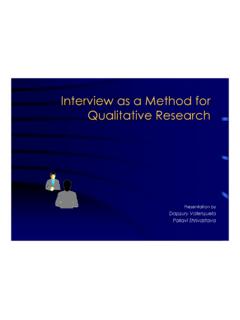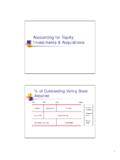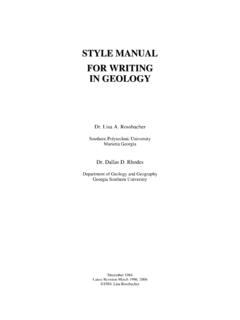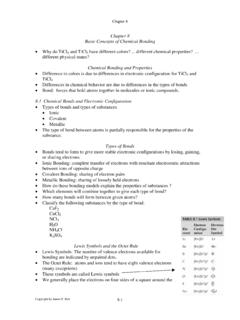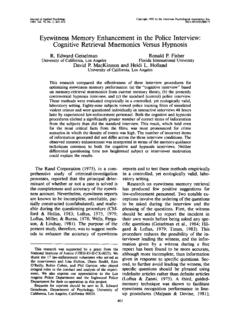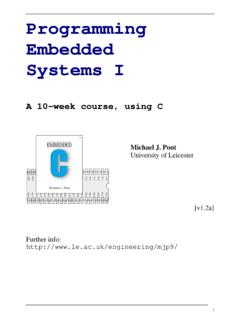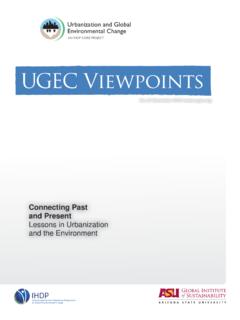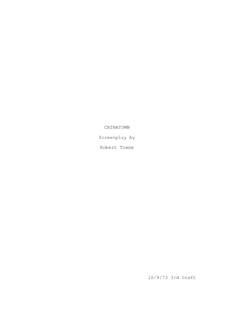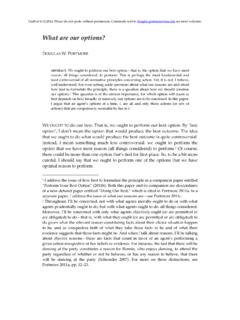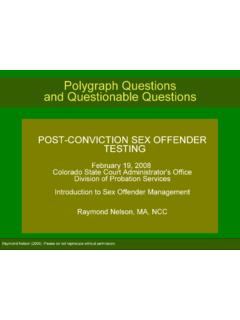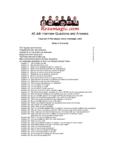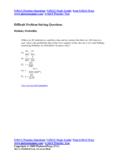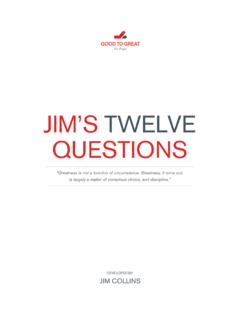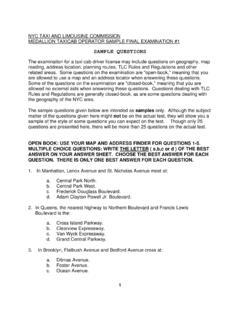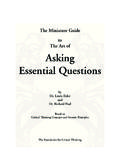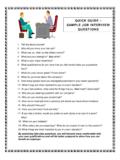Transcription of DEVELOPING HYPOTHESIS AND RESEARCH QUESTIONS
1 DEVELOPING HYPOTHESES& RESEARCH QUESTIONSS haliniPrasadAjith Rao Eeshoo Rehani500 RESEARCH METHODSSEPTEMBER 18TH2001 DEVELOPING HYPOTHESIS AND RESEARCH QUESTIONSDEVELOPING HYPOTHESES& RESEARCH QUESTIONS Introduction Processes involved before formulating the hypotheses. Definition Nature of HYPOTHESIS Types How to formulate a Hypotheses inQuantitative ResearchQualitative RESEARCH Testing and Errors in Hypotheses SummaryDEVELOPING HYPOTHESES& RESEARCH QUESTIONSThe RESEARCH structure helps us create RESEARCH that is : Quantifiable Verifiable Replicable DefensibleCorollaries among the model, common sense & paper formatModelCommon SensePaper FormatResearch QuestionWhyIntroDevelop a TheoryYour Answer IntroIdentify Variables (if applicable)HowMethodIdentify hypothesesExpectations MethodTest the hypothesesCollect/Analyze data ResultsEvaluate the ResultsWhat it MeansConclusionCritical ReviewWhat it doesn t MeanConclusionDEVELOPING HYPOTHESES& RESEARCH QUESTIONSMost RESEARCH projects share the same general structure, which could be represented in the shape of an hourglass.
2 BEGIN WITH BROAD QUESTIONSNARROW DOWN, FOCUS INOPERATIONALIZEOBSERVEANALYZE DATAREACH CONCLUSIONSGENERALIZE BACK TO QUESTIONSThe Hourglass notion of researchDEVELOPING HYPOTHESES& RESEARCH QUESTIONSSome of the methods that are included for RESEARCH formulation are Where does the problem origination or discovery begin?Previous ExperienceTriggered InterestPotential problem fields Criteria of problems and problem statement Goals & Planning Search, Explore & Gather the Evidence Generate creative and logical alternative solutionsMaking the educated guess-the HYPOTHESIS ! DEVELOPING HYPOTHESES& RESEARCH QUESTIONSD efinitions of HYPOTHESIS Hypotheses are single tentative guesses, good hunches assumed for use in devising theory or planning experiments intended to be given a direct experimental test when possible . (Eric Rogers, 1966) A HYPOTHESIS is a conjectural statement of the relation between two or more variables.
3 (Kerlinger, 1956) HYPOTHESIS is a formal statement that presents the expected relationship between an independent and dependent variable. (Creswell, 1994) A RESEARCH question is essentially a HYPOTHESIS asked in the form of a question . DEVELOPING HYPOTHESES& RESEARCH QUESTIONSD efinitions of HYPOTHESIS It is a tentative prediction about the nature of the relationship between two or more variables. A HYPOTHESIS can be defined as a tentative explanation of the RESEARCH problem, a possible outcome of the RESEARCH , or an educated guess about the RESEARCH outcome. (Sarantakos, 1993: 1991) Hypotheses are always in declarative sentence form, an they relate, either generally or specifically , variables to variables. An HYPOTHESIS is a statement or explanation that is suggested byknowledge or observation but has not, yet, been proved or disproved.
4 (MacleodClark J and Hockey L 1981) DEVELOPING HYPOTHESES& RESEARCH QUESTIONSN ature of HYPOTHESIS The HYPOTHESIS is a clear statement of what is intended to be investigated. It should be specified before RESEARCH is conducted and openly stated in reporting the results. This allows to:Identify the RESEARCH objectivesIdentify the key abstract concepts involved in the researchIdentify its relationship to both the problem statement and the literature review A problem cannot be scientifically solved unless it is reducedto HYPOTHESIS form It is a powerful tool of advancement of knowledge, consistent with existing knowledge and conducive to further enquiry DEVELOPING HYPOTHESES& RESEARCH QUESTIONSN ature of HYPOTHESIS It can be tested verifiable or falsifiable Hypotheses are not moral or ethical QUESTIONS It is neither too specific nor to general It is a prediction of consequences It is considered valuable even if proven falseDEVELOPING HYPOTHESES& RESEARCH QUESTIONSAn the following situation.
5 You are a nutritionist working in a zoo, and one of your responsibilities is to develop a menu plan for the group of monkeys. In order to get all the vitamins they need, the monkeys have to be given fresh leaves as part of their diet. Choices you consider include leaves of the following species: (a) A (b) B (c) C (d) D and (e) E. You know that in the wild the monkeys eat mainly B leaves, but you suspect that this could be because they are safe whilst feeding in B trees, whereas eating any of the other species would make them vulnerable to predation. You design an experiment to find out which type of leaf the monkeys actually like best: You offer the monkeys all five types of leaves in equal quantities, and observe what they are many different experimental hypotheses you could formulate for the monkey study. For example:When offered all five types of leaves, the monkeys will preferentially feed on B leaves.
6 This statement satisfies both criteria for experimental hypotheses. It is a Prediction:It predicts the anticipated outcome of the experiment Testable: Once you have collected and evaluated your data ( observations of what the monkeys eat when all five types of leaves are offered), you knowwhether or not they ate more B leaves than the other types. DEVELOPING HYPOTHESES& RESEARCH QUESTIONSI ncorrect hypotheses would include:When offered all five types of leaves, the monkeys will preferentially eat the type they like best. This statement certainly sounds predictive, but it does not satisfy the second criterion: there is no way you can test whether it is true once you have the results ofyour study. Your data will show you whether the monkeys preferred one type of leaf, but not whythey preferred it ( , they like it best). I would, in fact, regard the above statement as anassumptionthat is inherent in the design of this experiment, rather than as a offered all five types of leaves, the monkeys will preferentially eat B leaves because they can eat these safely in their natural statement is problematic because its second part ('because they can eat these safely in their natural habitat') also fails to satisfy the criterion of testability.
7 You can tell whetherthe monkeys preferentially eat baobab leaves, but the results of this experiment cannot tell you why. In their natural habitat, howler monkeys that feed in B trees are less vulnerable to predation than monkeys that feed on A, C, D, or E. DEVELOPING HYPOTHESES& RESEARCH QUESTIONSThis is a perfectly good experimental HYPOTHESIS , but not for the experiment described inthe question . You could use this HYPOTHESIS if you did a study in the wild looking at how many monkeys get killed by predators whilst feeding on the leaves of A, B etc. However, for the experimental feeding study in the zoo it is neither a prediction nor testable. When offered all five types of leaves, which type will the monkeys eat preferentially?This is a question , and QUESTIONS fail to satisfy criterion #1: They are not predictive statements. Hence, a question is not a HYPOTHESES& RESEARCH QUESTIONST ypes of HypothesesNULL HYPOTHESESD esignated by: H0or HNPronounced as H oh or H-null ALTERNATIVE HYPOTHESESD esignated by: H1or HADEVELOPING HYPOTHESES& RESEARCH QUESTIONSThe null hypothesisrepresents a theory that has been put forward, either because it is believed to be true or because it is to be used asa basis for argument, but has not been proved.
8 Has serious outcome if incorrect decision is made!The alternative hypothesisis a statement of what a HYPOTHESIS test is set up to establish. Opposite of Null HYPOTHESIS . Only reached if H0is rejected. Frequently alternative is actual desired conclusion of the researcher! DEVELOPING HYPOTHESES& RESEARCH QUESTIONSEXAMPLEIn a clinical trial of a new drug, the null hypothesismight be that the new drug is no better, on average, than the current drug. We would write H0: there is no difference between the two drugs on alternative hypothesismight be that: the new drug has a different effect, on average, compared to that of the current drug. We would write H1: the two drugs have different effects, on average. the new drug is better, on average, than the current drug. We would write H1: the new drug is better than the current drug, on HYPOTHESES& RESEARCH QUESTIONSWe give special consideration to the null This is due to the fact that the null HYPOTHESIS relates to the statement being tested, whereas the alternative HYPOTHESIS relates to the statement to be accepted if / when the null is rejected.
9 The final conclusion, once the test has been carried out, is always given in terms of the null HYPOTHESIS . We either 'reject H0in favor of H1' or 'do not reject H0'; we never conclude 'reject H1', or even 'accept H1'. If we conclude 'do not reject H0', this does not necessarily mean that the null HYPOTHESIS is true, it only suggests that there is not sufficient evidence against H0in favor of H1; rejecting the null HYPOTHESIS then, suggests that the alternative HYPOTHESIS may be HYPOTHESES& RESEARCH QUESTIONSF ormulating a important to narrow a question down to one that can reasonably be studied in a RESEARCH project. The formulation of the HYPOTHESIS basically varies with the kindof RESEARCH project conducted:QUALITATIVEQUANTITATIVEDEVELOP ING HYPOTHESES& RESEARCH QUESTIONSCan also be divided into: ObservationPatternTentative hypothesisTheoryDeductiveInductiveTheory HypothesisObservationConfirmationDEVELOP ING HYPOTHESES& RESEARCH QUESTIONSQ ualitative ApproachThe use of RESEARCH QUESTIONS as opposed to objectives or HYPOTHESIS , is more Use of words-what or how.
10 Specify whether the study: discovers, seeks to understand, explores or describes the experiences. Use of non-directional wording in the question . These QUESTIONS describe, rather than relate variables or compare groups. The QUESTIONS are under continual review and reformulation-will evolve and change during study. The QUESTIONS are usually open-ended, without reference to the literature or theory. Use of a single HYPOTHESES& RESEARCH QUESTIONSThe rules of Qualitative researchKleiningoffers four rules for a scientific and qualitative process of approaching understanding to 1 (refers to subject / researcher)"Prior understandings of the phenomenon to be researched should be seen as provisional and should be transcended with [the discovery of] new information with which they are not consistent.
